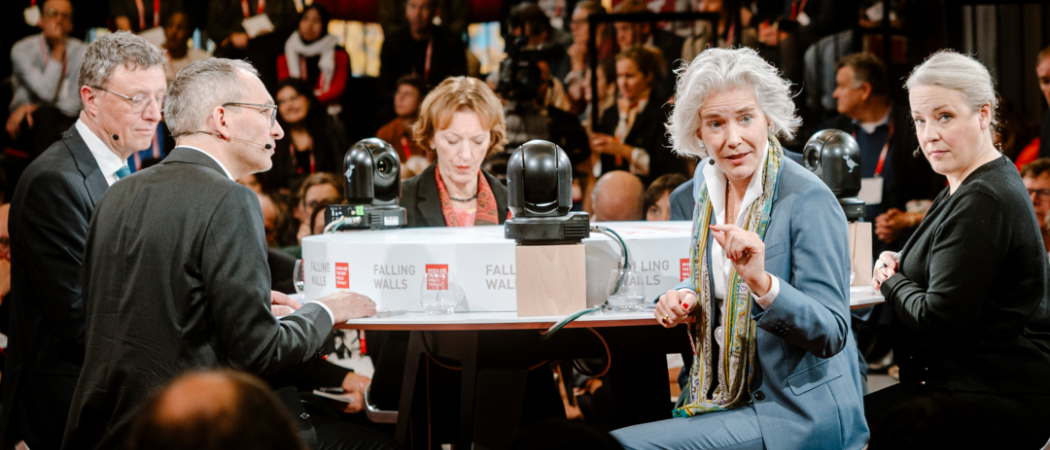European Research Council president says excessive bureaucracy and misplaced incentives are a threat to free scientific endeavour

A panel on academic freedom in Berlin, 8 November 2025. Photo credits: Falling Walls
An indirect “creeping reduction of freedom” is taking place in academia, according to Maria Leptin, president of the European Research Council (ERC), Europe’s main funder of fundamental research. This threat is distinct from government “oppression” of universities and scientists in populist regimes such as the US and Hungary.
Leptin made the comments during a panel discussion at Falling Walls, one of Europe’s largest science conferences, which takes place every November in Berlin to celebrate the era of international openness brought in by the fall of the Berlin wall on 9 November 1989.
Leptin said there are two threats to academic freedom. One is the direct pressure that government exert on academic institutions by controlling which universities and research groups tick the right ideological boxes and are worthy of public funding.
This type of threat has been documented in Hungary over the past decade, as the regime of Viktor Orbán tested the limits of higher education laws to push Central European University, a private organisation, out of the country, or to gain increased political control over public universities. This prompted the European Commission to withhold EU research funds to Hungarian academics.
Since January, the second Trump administration has been borrowing from the Orbán playbook and threatened to discontinue federal research funding for universities that refuse to follow the government’s political agenda.
Web of incentives
The second threat to academic freedom, Leptin said, is a byproduct of how higher education and research systems are organised around the world. There is a “web of incentives” in place, she said, that “don't necessarily support freedom [of research].”
This involves a mix of “constant calls for impact” by governments, the pressure to publish in in high-impact journals, and a lack of career perspectives that prevents scientists from “taking risky decisions, which are absolutely necessary for research.”
A further “constant call for impact,” involved demands from research funding organisations and governments that science solves societal problems.
Her comments come at a time when policymakers in Brussels are negotiating the future of European funding for research and innovation.
The Commission is putting R&D investments front and centre in a new push to revitalise the bloc’s global competitiveness, in the hope that new technologies will boost its stagnating economy. To this end, the next iteration of Horizon Europe, the EU’s research and innovation programme, is meant to be “tightly connected” to a new industrial policy funding tool called the European Competitiveness Fund.
In 2024, an expert group working on a set of recommendations for the future of Horizon Europe called for an overhaul of how grant paperwork is handled. Not all those recommendations made it into the legislative proposal for Horizon Europe, which was published in July, but the Commission has vowed to simplify funding procedures and reduce red tape.
No strings attached
“Freedom means no strings attached, and that's the exact opposite of bureaucracy,” Leptin told delegates at the Falling Walls conference in Berlin.
“It's important for scientific freedom that you have virtual space to think, that you have the funding, that you have the time, and that you don't have endless conditions that have nothing to do with scholarship.”
Related articles
- Attacks on academic freedom are spreading to democracies, report shows
- Viewpoint: What can Europe and its universities do to halt the erosion of academic freedom?
This is not about easy money, she went on. “Scientists don't mind having to compete for funds, they don't mind writing grants, they don't mind critique, they don't mind even justifying what they're doing,” she said.
“What they do mind is having to write grants every few minutes and when they're not writing a grant, they're reviewing somebody else's, or they're writing their final reports or their interim reports or their financial reports. That leaves no freedom,” Leptin said to the applause of hundreds of scientists in the room.





 A unique international forum for public research organisations and companies to connect their external engagement with strategic interests around their R&D system.
A unique international forum for public research organisations and companies to connect their external engagement with strategic interests around their R&D system.